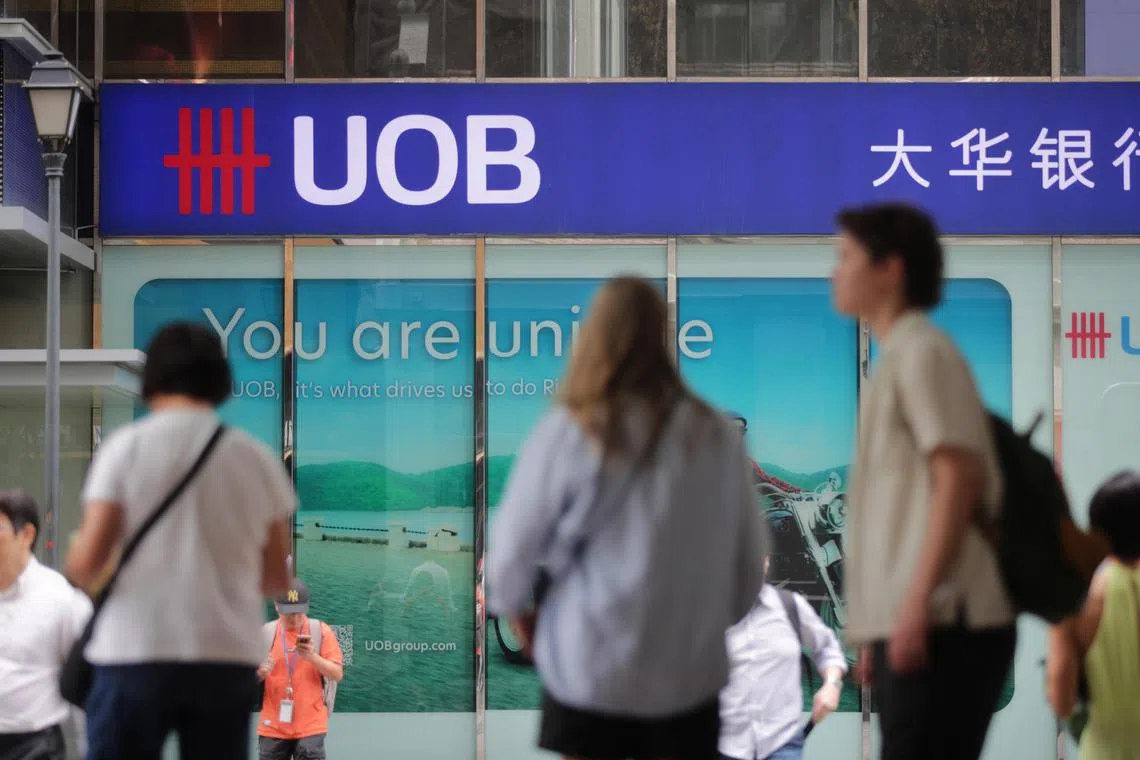UOB’s Q4 core earnings jump 37% to $1.4b; CEO highlights upsides amid risks ahead
Sign up now: Get ST's newsletters delivered to your inbox

UOB said its acquisition of Citigroup’s Malaysia and Thailand consumer businesses was completed in November.
ST PHOTO: GIN TAY
SINGAPORE – UOB’s chief executive on Thursday highlighted bright spots from the bank’s wholesale business and regional expansion, despite risks ahead from higher interest rates that propelled its fourth-quarter core earnings up 37 per cent to $1.4 billion. The earnings are higher than the average estimate of $1.2 billion from two analysts polled by Refinitiv.
Including one-off expenses related to UOB’s acquisition of Citigroup’s Malaysia and Thailand consumer businesses, net profit for the quarter to December 2022 rose by a smaller 13 per cent to $1.15 billion.
UOB recommended a final dividend of 75 cents a share. Together with the interim dividend of 60 cents a share, the total dividend for the full year will be $1.35 a share, representing a payout ratio of 49 per cent.
Earnings for the full year rose 12 per cent to $4.6 billion, or 18 per cent to $4.8 billion after factoring out the Citigroup acquisition. Both levels were fresh records.
The bank said its acquisition of Citigroup’s Malaysia and Thailand
UOB’s retail customer base expanded to nearly seven million in the region, with the addition of 1.3 million net customers from Citi Malaysia and Citi Thailand.
Deputy chairman and CEO Wee Ee Cheong said higher prices and interest rates will weigh on the global economy in 2023, but Asia should hold up well and see moderate growth, adding: “Consumption is coming back, people are travelling again and China is reopening. Trade and investment flows are ramping up. These are all positive for Asean.”
Mr Wee said that UOB’s acquisition of Citigroup’s regional consumer units is expected to add $1 billion to its revenue in 2023.
The deal also gives the bank “significant untapped potential” for its wealth management business, Mr Wee said, noting that economic recovery has also boosted card spending.
The lender’s fourth-quarter net interest income surged 53 per cent to $2.56 billion. This came as net interest margin (NIM) – a key gauge of profitability – rose 66 basis points.
However, loans grew just 3 per cent from a year ago.
Mr Wee said: “If you look at last year, it was quite uncertain (given the global economy). The loan growth is not robust, partly because we are selective but also because if you are a quality customer, you want to pay down the loan.
“If they are paying down the loan, it means they have the capacity. In the second half of this year, loans may pick up again if they think that the cost of funds is something they have no choice about... So I am not overly concerned about the loan growth.”
While rising interest rates have boosted banks’ margins, they also weigh on demand for loans and bring more competition for customer deposits as people seek products elsewhere with higher yields.
UOB shares closed down 4.4 per cent to $29.62 on Thursday. OCBC Bank slid 2 per cent to $12.64, while DBS declined 0.9 per cent to $34.34.
UOB sees a bright spot in its wholesale business, with group chief financial officer Lee Wai Fai noting that its cash management platform has driven corporate customers’ digital adoption of its services.
This has yielded significant growth in transaction volumes and cashless payments, resulting in a steady base of current and savings accounts deposits by wholesale customers and soothing the outflow of such deposits in the retail segment.
Mr Lee expects the decline in retail customers’ deposits to slow as interest rate hikes taper in 2023.
The bank’s customer deposits grew 5 per cent in 2022, buoyed by fixed deposits among retail customers.
For 2023, UOB forecasts mid-single-digit loan growth, with NIM staying around 2.22 per cent. It also sees double-digit fee growth on the back of a low base.
NIM might continue to rise in the first half of the year before subsequently moderating, said Mr Lee, noting that the United States Federal Reserve is unlikely to cut rates in 2023.
Meanwhile, UOB’s net fee income dipped 16 per cent to $485 million as robust credit card fees were more than offset by softer wealth management and loan-related fees.
The bank set aside more provisions for potential bad debt, to the tune of $184 million, from higher specific allowance on “a few non-systemic accounts”.
But Mr Lee said: “We are very confident that our general allowances will be sufficient to cushion any anticipated slowdown or credit loss from our portfolio.”
DBS on Feb 13 reported a 69 per cent jump in fourth-quarter earnings to $2.34 billion, while OCBC will post its results on Friday.



